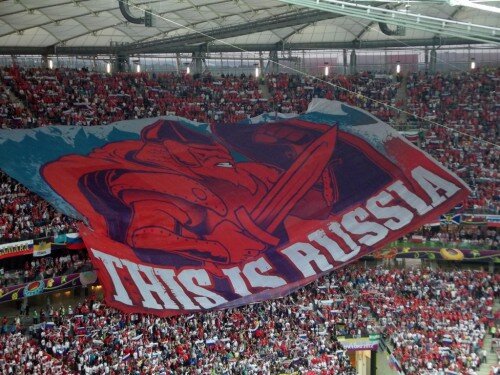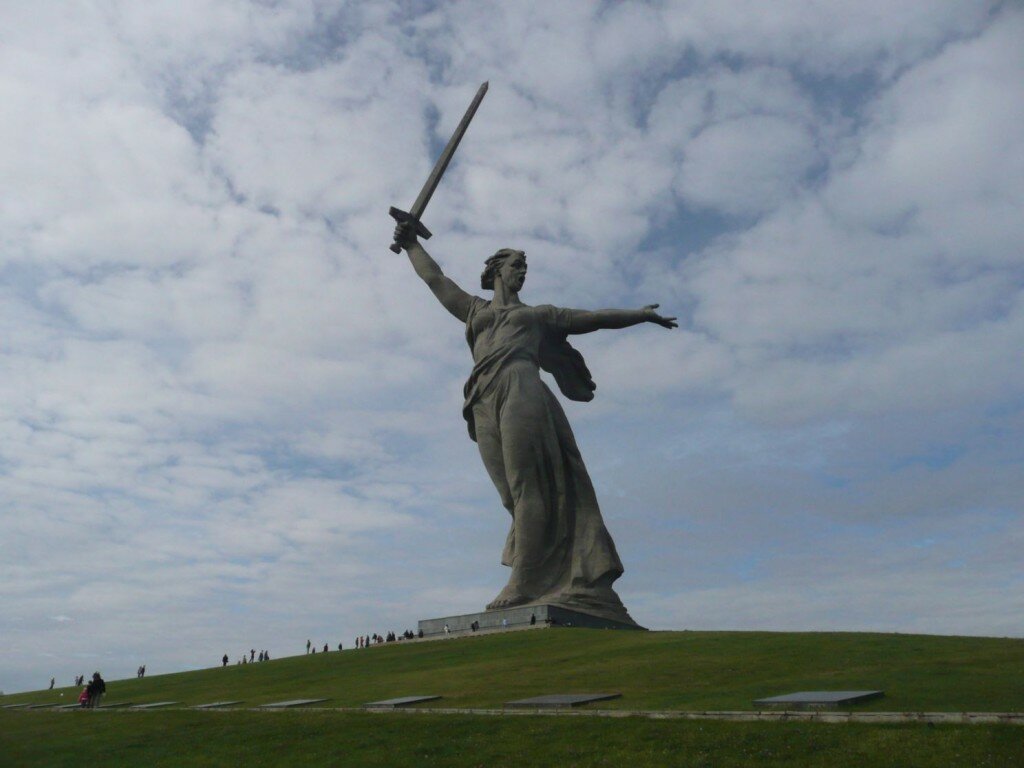 The announcement of Russia’s host cities for the 2018 World Cup was hardly the big football story of the weekend. It all seems like a long way off right now – we’ve got Brazil to get through first. But, most football fans probably have an idea of what a World Cup in Brazil will look like, less so one in Russia. Their winning bid was tainted by association with the genuinely farcical scenario that will see Qatar hosting the second biggest sporting event in the world. In the desert. Oh, and there was also the overwhelming stench of corruption that clings to FIFA’s bid process, but we all know about that. I’d rather focus on the allure of Russia’s World Cup.
The announcement of Russia’s host cities for the 2018 World Cup was hardly the big football story of the weekend. It all seems like a long way off right now – we’ve got Brazil to get through first. But, most football fans probably have an idea of what a World Cup in Brazil will look like, less so one in Russia. Their winning bid was tainted by association with the genuinely farcical scenario that will see Qatar hosting the second biggest sporting event in the world. In the desert. Oh, and there was also the overwhelming stench of corruption that clings to FIFA’s bid process, but we all know about that. I’d rather focus on the allure of Russia’s World Cup.
Most of the larger European countries could put on a decent tournament for the fans, but it wouldn’t be that exciting to have another tournament in Germany, France, or Italy. There wouldn’t be any sense of discovery. In 1990, when Serie A was the indisputable power house of European football, there was still a sense of anticipation at having a World Cup in Italy. Everyone knew it was the home of the richest league, with the best players and biggest stadiums, but you didn’t see much of it on TV. My Dad, a second generation Italian, had read about Roberto Baggio, but had barely seen him play. He couldn’t wait to watch him live and to see the vast stadiums in all their glory. It’s feelings like this that our over-exposure to football has made increasingly rare, as articulated by Georgina Turner and Rob Smyth in their (unflattering) musings on modern football, Jumpers for Goalposts.
Now, I know that the Russian Premier League is on ESPN (UK), but in the absence of viewing figures, I’m going to assume that they’re probably quite low. And apart from a few self-styled European Football Experts (who will be sneering at this entire paragraph), you don’t hear or read much discussion of it in the UK media.
Despite this, the overall perception of Russian football is changing. Russia has proved it means business. Whatever you feel about Chelsea and their methods, Roman Abramovich has invested huge sums (estimated at approx £1bn) in English football, and has a Champions League title to show for it. The big change is that we’re now seeing greater investment and ambition in Russian football, reflected in Zenit St Petersburg’s signing of Hulk from Porto. This is just the latest stage of development in Russian football during the past decade that has seen Zenit winning the UEFA Cup and a massively improved Russian national team.

Artist's impression of the new Zenit Arena in St Petersburg
The older powers of Europe might find the big spending garish, but Russia is still an interesting host in all the ways that Qatar isn’t. For one, it’s massive. Look at a map of the world – Russia has a border with pretty much everyone, stretching all the way from EU states in the West to China in the East. And, at its most Eastern point, it’s separated from the USA by only 53 miles of water. That, comrades, is a large country.It’s sheer vastness is staggering; there is so much of it that many of us know nothing about.
Imagine if the World Cup organisers had really gone to town and utilised Vladivostock in the East, you’d definitely need to plan that one in advance if you were getting the train from Moscow – it takes about five days to cover the 5,596 miles. That’d be some football special, you sense they’d need to make a few beer stops to re-stock along the way.
Mercifully, the tournament will be focused on what is described as European Russia, utilising the main cities in the Western region. Still, the Western bit of Russia dwarfs most European nations. For example, in 2018 you could end up travelling between St Petersburg, not too far from the Finnish border, and Samara, which is near Khazakstan – a mere 1,100 miles.
As for the sights, you’ve got the immenseness of Tsarist Russia in St Petersburg – a stunning city built to impress the neighbouring monarchs. I was lucky enough to visit about ten years ago, and can report that these days it’s home to some more contemporary Russian nightlife in the form of the Metro Club – three floors of pumping Euro Dance hell. I haven’t been to Moscow, but they have some obvious things to check out too – and by obvious I mean Lenin’s corpse.
But, what could be really fascinating for fans is the exposure of some lesser known but equally historic cities, like Volgograd – formerly known as Stalingrad and the location for one of the most brutal and decisive battles in the Second World War. There’s plenty to read on that one, and it’s not a fun tale. The casualties have been immortalised in this enormous and frankly terrifying memorial – Motherland Calls:

Blimey.
There will of course be plenty of new facilities with Russia reportedly spending up to £20bn on hosting the tournament. Expect to see some pretty slick stadiums and improved transport links. However, there are significant negatives associated with a nation investing so heavily, the most obvious being the burden on the host to recoup that money from visiting fans. Manchester United and Chelsea supporters complained about the prohibitive costs when visiting Moscow for the 2008 Champions League final. It’s only going to get more expensive once FIFA gets involved. A news story announcing the host cities on the official FIFA Russia 2018 had a familiar and depressing tone:
The news from Russia received a warm welcome from FIFA’s official partners and FIFA World Cup sponsors. “Coca-Cola is a long-standing and permanent FIFA partner, and has supported world football since 1974,” said Zoran Vucinic, President of Coca-Cola in Russia, Ukraine and Belarus.
Hooray! What’s that? Is that the sound of a thousand small businesses located near stadiums being closed down or relocated? South Africa showed us how this works. World Cups aren’t what they were; it’s foolish to pretend otherwise. But, the recent European Championships showed that new hosts can provide a bit of extra intrigue. There’s a hell of a lot riding on 2018; with Qatar to follow, there might not be much of World Cup left to look forward to in 2026. Let’s hope can Russia can get it right. I’ve got a hunch they will – surely no one with an anthem this proud will let us down.


Pingback: Motherland Calls – the World Cup in Russia « Scissors Kick